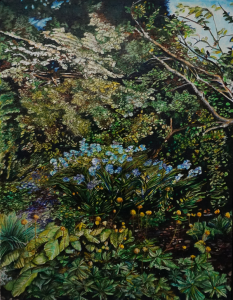
Pretend that you find yourself in a scary situation. Not temporary fear, like the jolt you get when you imagine you hear someone creeping up your staircase at night. I’m talking about a low-level, constant fear, the kind you that comes when you have a serious health scare or maybe it’s how you felt all through junior high gym class (or really, the entirety of adolescence if you were anything like me) or perhaps it’s the back-of-the-neck, encroaching fear you would experience if you had a political leader who appeared to exhibit impulse control combined with a need to be adored and a trigger-hair temper. And then let’s imagine that your fears keeps getting reinforced and possibly even escalated? What then? If you’re a writer, you write about it. You write about the disbelief you experience as something new and unexpected develops, or you write about listening to a transcript wherein your leader appears to believe that Frederick Douglass is still alive and maybe living somewhere in a blighted urban community.
That doesn’t mean you have to keep a journal, though you should probably do that to.
If you’re a fiction writer, write about a tense family dinner or a dissolving relationship (see Nathan Englander’s “What We Talk about When we Talk about Anne Frank”), or a dystopian society (see Brave New World) or create a war between farm animals to mirror a political movement. If you write poetry, careful assemble your words to create an arsenal of images that encapsulate your concerns, your experiences (the Poetry Foundation offers a list of poems for inspiration at https://www.poetryfoundation.org/poems-and-poets/poems/detail/58014). For nonfiction writers, describe the worn face of the woman standing next to you in Shop Rite, wearing whatever button she’s wearing and the assumptions you make about her (good or bad) based on this minor detail. Write about your grandmother’s immigration experience fleeing the Khmer Rouge in Cambodia and how she had to walk over exploded bodies to avoid land mines.
Like it or not, we are living through a time in America that is unprecedented. Your observations and your stories are need to capture these moments. Write it all down, or at least allow yourself to channel whatever you’re feeling into your work; use your artistic expression to fight this nebulous sense of fear and dread that seems to want to grip us by the throat. Let this sentence from Chapter 1 of Orwell’s 1984 be your guide:
“The Ministry of Truth — Minitrue, in Newspeak — was startlingly different from any other object in sight. It was an enormous pyramidal structure of glittering white concrete, soaring up, terrace after terrace, 300 metres into the air. From where Winston stood it was just possible to read, picked out on its white face in elegant lettering, the three slogans of the Party:
WAR IS PEACE
FREEDOM IS SLAVERY
IGNORANCE IS STRENGTH”
So much more potency in describing the vivid and particular than you could ever achieve by ranting on Facebook.
Speaking of this: don’t squander your creative energy on social media to combat the views of the high school friend of your sister-in-law. We want so desperately to be right and to set straight those we don’t agree with. But social media can quickly devolve into ad hominem attacks and you can find yourself shouting at your laptop (this has never happened to me, of course) or spending enormous mental space searching for the perfect, searing retort.
Click that box shut. Open a new file, and write the first scene to your new novel instead. Put your energy forward, use all of your heart, and begin filling the page. That is how you fight the darkness.